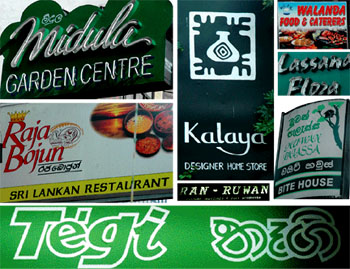|
observer |
|
|
|
|
|
OTHER LINKS |

|

|

|
Sinhala titles in English: The new EngsalaAngalum, Tegi, Lunu Miris, Kalaya, Ambula, Muwan Palessa, Midula, Raja Bojun...titles and signboards with an ethnic root are countless. The Sri Lankan fad of writing English words such as Hardware, Grocery and Enterprises in Sinhala, is slowly being replaced by these ethnic but hip titles.
A mere half hour drive from Colombo to any part of the country will make you discover this new trend, the unique awakening in the ethnic flavour of Sri Lankans. From food outlets to clothes shops, household goods to newest products of insurance companies - they all share one common trend - Sinhala titles in English. These Sinhala titles in English heralds another healthy sign - the country is progressing to a more recognisable language? Or is it? "This could be a new trend in Sri Lanka. But as far as the English language is concerned, mixing and borrowing has always been associated with this universal language," says Dr.Manique Gunasekera, Head of the Department of English, University of Kelaniya. "These signboards and titles clearly show the characteristics of the 21st century English and Sinhala. There is nothing wrong with it," stresses Dr. Gunasekara. Prof. J.B. Dissanayake echoed the view pointing out that mixing local languages with English is the newest trend in countries around the world. "This type of change in the language is bearable, as long as they are not using too many English words with Sinhala. English is a language that could retain assualts unlike Sinhala, which is a smaller language," says Prof. Dissanyake. "On the other hand, this is not only happening in Sri Lanka. People across the globe who are caught up in urbanisation and busy lifestyles in the city try to regain what they have lost through this type of means," notes Prof. Dissanayake. "It was not very long ago that hardware and grocery owners insisted on having English words written in Sinhala, either because they felt inferior or preferred the use of a prestigious language such as English. However, people going back to their ethnic roots and the sudden rise in preference for ethnic flavour is a positive sign" feels Prof. Dissanayake. |







